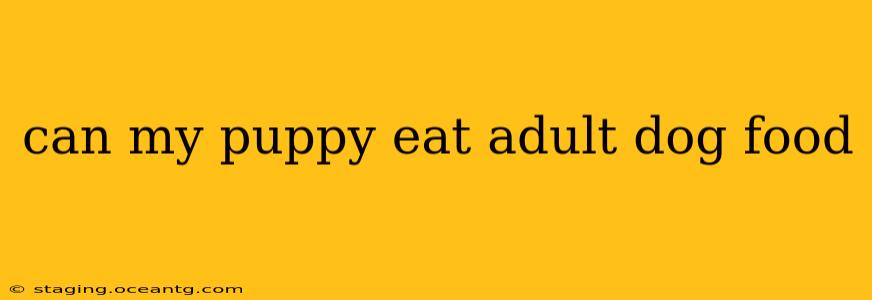The simple answer is: generally, no. While it might seem like a cost-saving measure or a convenient solution, feeding your puppy adult dog food can have several negative consequences for their health and development. Understanding the nutritional differences between puppy and adult dog food is crucial for raising a healthy and happy canine companion. This comprehensive guide will delve into the reasons why puppy food is essential and address some common concerns.
Why Puppy Food is Different
Puppies are in a period of rapid growth and development, requiring a diet significantly different from that of adult dogs. Puppy food is specially formulated to meet their unique nutritional needs, focusing on:
-
Higher Calorie Density: Puppies need more energy to support their growth spurts and higher activity levels. Adult dog food often has a lower calorie density, potentially leading to malnutrition and stunted growth in puppies.
-
Increased Protein and Fat: Protein is the building block of muscles and tissues, while fat provides essential fatty acids for brain development and overall health. Puppy food contains higher levels of both to fuel this rapid development.
-
Essential Nutrients: Specific vitamins and minerals, like calcium and phosphorus, are crucial for bone development in puppies. Puppy food is fortified with these essential nutrients at levels tailored to their needs. Adult dog food may lack these vital components in sufficient quantities.
-
Smaller Kibble Size: Puppies have smaller mouths and developing teeth. Smaller kibble size makes it easier for them to chew and digest their food, preventing choking hazards and promoting proper dental health.
What Happens if My Puppy Eats Adult Dog Food?
Feeding your puppy adult dog food can lead to several problems, including:
-
Stunted Growth: The lack of sufficient calories, protein, and essential nutrients can hinder their growth and development, resulting in a smaller adult size than genetically programmed.
-
Nutritional Deficiencies: This can manifest in various health issues, including weak bones, poor coat condition, weakened immune system, and developmental problems.
-
Digestive Issues: The different composition of adult food might lead to digestive upset, such as diarrhea, vomiting, or constipation.
-
Obesity or Weight Problems: While seemingly counterintuitive, if the adult food is high in fillers, your puppy might consume more to feel full, leading to potential obesity problems despite not getting the necessary nutrients.
Can Adult Dog Food Be Harmful to Puppies?
While not immediately life-threatening in small quantities, consistent feeding of adult dog food can be harmful over time. The nutritional deficiencies it causes can lead to long-term health problems that impact their quality of life.
What if My Puppy Accidentally Ate Adult Dog Food?
A small amount of accidental consumption is unlikely to cause serious harm. However, monitor your puppy for any signs of digestive upset, such as vomiting or diarrhea. If you notice any concerning symptoms, consult your veterinarian immediately.
How to Transition to Adult Dog Food (When Appropriate)
The transition to adult dog food should be gradual and only when your veterinarian determines your puppy is fully mature. A slow transition helps prevent digestive upset. Generally, this transition starts when the puppy is close to 1 year of age, but the exact timing varies depending on the breed and size. Your vet can provide personalized advice.
Choosing the Right Puppy Food
Selecting appropriate puppy food is crucial for your pet's health. Consider the following:
-
Breed Size: Different breeds have different growth rates and nutritional requirements. Choose food specifically formulated for small, medium, or large breeds.
-
Age: Look for food labeled for puppies of your dog's specific age range.
-
Ingredients: Look for high-quality protein sources as the primary ingredient, and avoid artificial colors, flavors, and preservatives.
-
Your Veterinarian's Recommendation: Consult your veterinarian for advice on the best puppy food for your specific dog's needs.
By understanding the nutritional differences between puppy and adult dog food and by choosing the right food for your puppy, you'll be well on your way to raising a healthy and happy canine companion. Remember, consulting your veterinarian is always the best way to ensure your puppy receives the proper nutrition.
